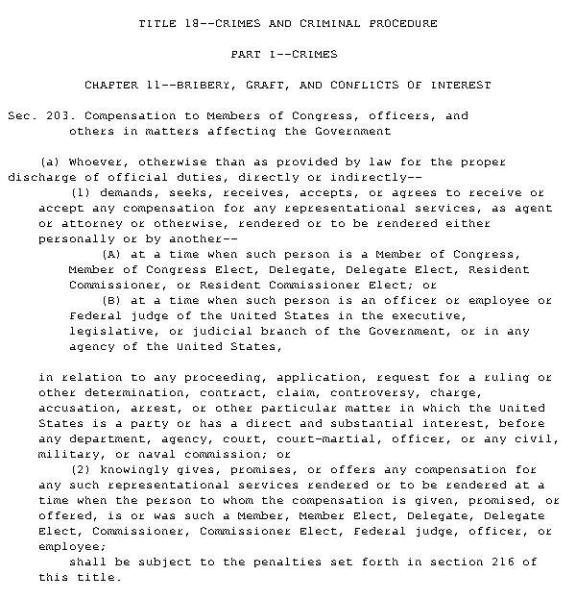I’ve pointed out that Washington is a cesspool of legal corruption. But if you don’t believe me (and you have a strong stomach), feel free to peruse these posts, all of which highlight odious examples of government sleaze.
But occasionally elected officials cross the blurry line and get in trouble for illegal corruption.
For those of you who follow politics, you may have seen news reports suggesting that Robert Menendez, a Democratic Senator from New Jersey, will soon be indicted for the alleged quid pro quo of trying to line the pockets of a major donor.
Attorney General Eric Holder has signed off on prosecutors’ plans to charge Menendez, CNN reported on Friday. …A federal grand jury has been investigating whether Menendez improperly used his official office to advocate on Melgen’s behalf about the disputed Medicare regulations when he met with the agency’s acting administrator and with the secretary of Health and Human Services, according to a ruling by a federal appeals court that became public last week. The ruling also said the government was looking at efforts by Menendez’s office to assist a company Melgen partly owned that had a port security contract in the Dominican Republic.
I certainly have no interest in defending Senator Menendez, but I can’t help but wonder what’s the difference between his alleged misbehavior and the actions of almost every other politician in Washington.
Here’s what I assume to be the relevant part of the criminal code, which Idownloaded from the Office of Government Ethics (yes, that’s a bit of an oxymoron).
Stripped of all the legalese, it basically says that if a politician does something that provides value to another person, and that person as a result also gives something of value to the politician, that quid-pro-quo swap is a criminal offense.
Now keep this language from the criminal code in mind as we look at some very disappointing behavior by Republican presidential candidates at a recent Iowa gathering.
As Wall Street Journal opined, GOPers at the Ag Summit basically competed to promise unearned benefits to the corporate-welfare crowd in exchange for political support (i.e., something of great value to politicians).
Iowa is…a bad place to start is because it’s the heartland of Republican corporate welfare. Witness this weekend’s pander fest known as the Ag Summit, in which the potential 2016 candidates competed to proclaim their devotion to the Renewable Fuel Standard and the 2.3-cent per kilowatt hour wind-production tax credit. The event was hosted by ethanol kingpin Bruce Rastetter… Two of the biggest enthusiasts were Rick Santorum and Mike Huckabee… The fuel standard “creates jobs in small town and rural America, which is where people are hurting,” said Mr. Santorum, who must have missed the boom in farm incomes of recent years.
But it’s not just social conservatives who were promising to swap subsidies for political support.
Self-styled conservative reformers may be willing to take on government unions, which is laudable, but they get timid when dealing with moochers in Iowa.
Scott Walker, who in 2006 said he opposed the renewable fuel standard, did a switcheroo and now sounds like St. Augustine. He’s for ethanol chastity, but not yet. The Wisconsin Governor said his long-term goal is to reach a point when “eventually you didn’t need to have a standard,” but for now mandating ethanol is necessary to ensure “market access.”
And establishment candidates also tiptoed around the issue, suggesting at the very least a continuation of the quid pro quo of subsidies in exchange for political support.
Jeb Bush at least called for phasing out the wind credit, which was supposed to be temporary when it became law in 1992. But he danced around the renewable standard, which became law when his brother signed the energy bill passed by the Nancy Pelosi-Harry Reid Congress.
Geesh, maybe this is why Bush won’t promise to oppose tax hikes.
And there are more weak-kneed GOPers willing to trade our money to boost their careers.
Chris Christie wouldn’t repudiate the wind tax credit, perhaps because in 2010 the New Jersey Governor signed into law $100 million in state tax credits for offshore wind production. He also endorsed the RFS as the law of the land…, but what voters want to know is what Mr. Christie thinks the law should be. Former Texas Governor Rick Perry sounded somewhat contrite for supporting the wind tax credit, which has been a boon for Texas energy companies.
The only Republican who rejected corporate welfare (among those who participated) was Senator Ted Cruz.
The only Ag Summiteer who flat-out opposed the RFS was Texas Senator Ted Cruz , who has also sponsored a bill in Congress to repeal it. In response to Mr. Rastetter’s claim that oil companies were shutting ethanol out of the market, he noted “there are remedies in the antitrust laws to deal with that if you’re having market access blocked.”
Though even Cruz deviated from free-market principles by suggesting that anti-trust bureaucrats should use the coercive power of government to force oil companies to help peddle competing products.
Sigh.
By the way, I don’t mean to single out Republicans. Trading votes for campaign cash is a bipartisan problem in Washington.
But it is rather disappointing that the politicians who claim to support free markets and small government are so quick to reverse field when trolling for votes and money.
At least politicians like Obama don’t pretend to be a friend before stealing my money.


